Current Fellows
Gideon Bohak

Gideon Bohak is a professor in the Department of Jewish Philosophy and Talmud at Tel Aviv University. He is a world-leading expert on Jewish magic, especially in antiquity and the Middle Ages; in particular, he has contributed to the study of the texts of the Cairo Genizah in numerous contributions. He is the author of the seminal book Ancient Jewish Magic. A History (2008).
Bill Rebiger
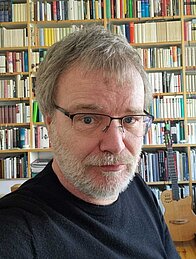
Bill Rebiger is a scholar in Jewish studies with a special focus on Jewish magic and Kabbalah. He has published widely, including editions of two prominent treatises of Jewish magic: Sefer Shimmush Tehillim or ‘Book of the Magical Use of Psalms’ and Sefer ha-Razim or ‘Book of Secrets.’ In his MagEIA project, he would like to develop a theory of performative haptic acts for the phenomenon of magical-ritual healing through the physical touch of a miracle healer or other charismatic personality, as attested in late antique Jewish and Christian texts.
Hrach Martirosyan
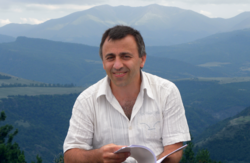
Hrach Martirosyan was born in 1964, November 10, in Kirovakan (nowadays Vanadzor), Armenia. After graduating from Vanadzor Pedagogical Institute where he studied Armenian Language and Literature (1986-1991), he worked at the Institute of Archaeology and Ethnography of the Armenian Academy of Sciences in Yerevan as a researcher under the supervision of Prof. Dr. Sargis Harutyunyan (1991-1994). In 2001, Dr. Martirosyan was admitted to the PhD program of Leiden University (promoter: Prof. J. Weitenberg; project “Indo-European Etymological Dictionary” under Prof. Lubotsky’s guidance). The dissertation was successfully defended at Leiden University on February 13, 2008. Its revised and supplemented version was published by “Brill” in Leiden (“Etymological dictionary of the Armenian inherited lexicon”, 2010, circa 1000 pages).
Martirosyan was a researcher or a guest lecturer in Leiden, Michigan, Yerevan, Vanadzor, Oxford, Pavia, Moscow, Hokkaido, and elsewhere. From 2015 February to 2017 March, he held a postdoc position at Institute of Iranian Studies, Austrian Academy of Sciences, Vienna (project leader: Velizar Sadovski; resulted book: “Iranian personal names in Armenian collateral tradition”. Iranisches Personennamenbuch V/3, Vienna: Austrian Academy of Sciences Press, 2021). Since 2019 September, he was a Lecturer of Modern Eastern Armenian and Classical Armenian at UCLA (University of California, Los Angeles). From 2021 November to 2023 July, he was an Alexander von Humboldt senior research fellow at Turfanforschung: Berlin-Brandenburgische Akademie der Wissenschaften (research on Iranian loanwords in Armenian).
Since 2022 December, Martirosyan is the leader of the project “The Armenian language, land, and culture in the context of the Armenian Highlands” in the frames of the Call for Remote laboratories Fellowship Programme: Armenia, launched by the RA Science Committee. He carries out an online course and a research project on the History of the Armenian language at “Hayerenagitut‘yan akademia.”
In his MagEIA project, Hrach Martirosyan will examine the Armenian lexicon related to the semantic domain ‘magic’ covering magical art and practices, witchcraft, spells, and incantations.
Dan Levene
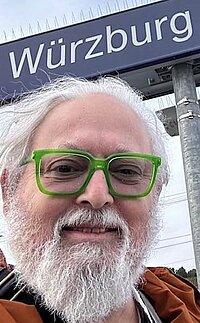
Professor Dan Levene is a specialist in healing traditions in the Semitic language speaking world, specifically relating to the Christian and Jewish cultures. His expertise in Hebrew, Aramaic dialects, Syriac and Geez has meant that he has been able to focus much of his publication on the production of historical texts that deal with well-being. In more recent years Levene has been working in Ethiopia (where he spent part of his childhood) investigating both historical texts and living traditions. Furthermore, he has been involved with The Tropical Health Education Trust (THET) as a proponent of raising awareness of modern medical doctors’ understanding of traditional beliefs and customs.
Mersha Alehegne Mengistie
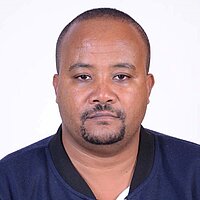
Mersha Mengistie is an Ethiopian Studies scientist, philologist, literary scholar, and cultural activist. He has been an Associate Professor of Philology in the Department of Linguistics and Philology at Addis Ababa University since June 2018. He began his career with a diploma in teaching from Kotebe College of Teacher Education in 1995 and taught at the secondary school level for two years before advancing his studies at Addis Ababa University.
He holds a B.A. in Ethiopian Languages and Literature (1997) and an M.A. in Literature (Foreign Languages) (2003), both from Addis Ababa University, along with a Ph.D. in Ethiopian Studies and Philology (2010) from the University of Hamburg, Germany. He also completed an M.A. in Social Work in 2023 at Addis Ababa University. His Ph.D. studies were supported by a DAAD fellowship.
During his sabbatical and subsequent years (2018–2021), Mengistie received a fellowship from the Alexander Humboldt Foundation, where he worked on a project titled "Parchment Saints: Life and Afterlife of Ethiopian Saints from Parchment to Paper," which is currently in press with Brill. Following his fellowship, he was awarded a research grant for the project "Documenting Ancient Education Systems in Africa: Abennat Temhert in Ethiopia" funded by the Gerda Henkel Foundation. In this collaborative research, he co-leads three Ph.D. students who are developing their doctoral projects related to the project's themes. Additionally, he oversees several other initiatives throughout Ethiopia.
Gaby Abou Samra
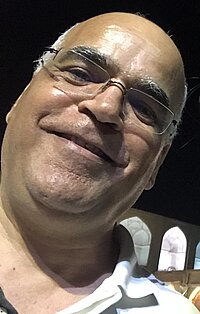
Gaby Abou Samra is Professor of Epigraphy and Semitic Studies at the Lebanese University, Beirut. His research focuses on the iconographic and textual analysis of magic bowls in Aramaic, Syriac and Mandaean. Particular attention is paid to morphology and syntax in order to enable philological analyses and comparisons with other Semitic texts (e.g. Bible, Talmud, rabbinic literature). Prof. Abou Samra's research focuses on Phoenician, Aramaic, Hebrew, Syriac and Arabic inscriptions.
His research at MagEIA will focus on the contents of magical bowls: iconography and texts (Aramaic, Syriac, and Mandaic). He will point out several grammatical targets: morphology, syntax, philological commentary, comparative studies with other semitic texts (Bible, Talmud, Rabbinic literature…).
Frank Simons
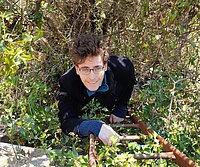
Frank Simons is a postdoctoral researcher at Trinity College Dublin, with a project on Mesopotamian Psychiatry. His research focusses on magic and divination in Mesopotamia, in particular on the reconstruction and poetics of ancient texts. He is also interested in the realia of the ancient world and has recently published papers offering identifications of animals and diseases found in cuneiform texts.
Within MagEIA, he is preparing a critical edition of the ritual and incantation series Šurpu ‘Burning’ – a 1200 line text detailing an extensive ceremony to be carried out to rid a sufferer of a divine curse.
Charlotte Rose

Her project with MagEIA, "Tools of Medicine: Materials in Medical-Magical Spells", addresses the correspondence between medical-magical texts and material culture by examining the relationship between Hieratic medical-magical texts of mainly the Middle and New Kingdoms and the objects pertaining to them, taking a diachronic lens. This research branches off of her dissertation, Changes and Continuity: Ancient Egyptian Birth Practices from the Middle Kingdom through the New Kingdom, which examined the textual evidence and material culture of ancient Egyptian birth and fertility traditions through a diachronic lens. By examining the correspondence between medical-magical texts and material culture, this project aims to render a more complete understanding of daily-life magic.
Paola Dardano

Paola Dardano's research focuses on historical-comparative linguistics, particularly the Hittite and Greek languages. Her interests include the morphosyntax and phraseology of Indo-European languages, the theory and methods of etymology, the Indo-European poetic language, and contact linguistics. She was a research fellow of the Alexander von Humboldt Foundation at the University of Cologne from 2008-2009. Since December 2019 she has been a full professor at the Università per Stranieri di Siena. In her MagEIA project she will examine the terminology and phraseology of Hittite magical texts.
Jonathan Beltz

Jon Beltz recently completed his PhD in Assyriology at Yale University. His research focuses on the religion and literature of ancient Mesopotamia, and in particular the nature of deities and demons and exorcistic magical texts. His dissertation, Namtar: Deity, Demon, Agent of Fate, examines the roles and nature of a Mesopotamian chthonic figure, Namtar, a sort of grim reaper in Mesopotamian mythology. He also has a forthcoming article publishing several Sumerian amuletic incantations and has worked on the function of inscribed amulets in ancient Mesopotamia. At the MagEIA Centre for Advanced Studies he will begin his next project, an updated edition of a group of Sumerian and bilingual Sumero-Akkadian incantations known as zi–pa3 incantations.






